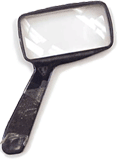Page 1 of 15 next »
Your Hunt Begins
An introduction to the ten step process
- RESEARCH
-
Systematic inquiry into a subject to discover or revise facts, theories, etc....to make an extensive investigation into.
Random House College Dictionary/Rev.

Doing research can be dull or it can be exciting. It depends upon your point of view.
If you're a first year freshman, it may seem like drudgery. But as Hollywood has shown, for a detective it's an exciting journey filled with the unexpected. Because you see, detective work is essentially research work.
When confronted with a murder a detective follows steps in a process of elimination, to figure out "Who done it."
First, they get a feel for the situation, gathering background information so they know the outline of what happened. Next, they think about the crime ’ the questions that need to be answered. (Why were the victim's shoelaces undone? What is the origin of that strange knife with which he was stabbed?)
Then, they look at documents and interview people to try and find answers to those questions. In the process, they come up with new questions or decide to go after an entirely different lead. All the while, the detective keeps track of where information came from for use when they go to court or realize they must retrace their steps.
Just like detective work, research is a hunt for the truth. It is getting to know a subject by reading up on it, reflecting, playing with the ideas, choosing the areas that interest you and following up on them. But in order to research effectively, you have to have a research strategy.
In this unit you will find a 10-step research strategy that works well with almost any topic and can be adapted as needed.
| The Steps | |
| STEP 1: | Formulate your question |
| STEP 2: | Get background information |
| STEP 3: | Refine your search topic |
| STEP 4: | Consider your resource options |
| STEP 5: | Select the appropriate tool |
| STEP 6: | Use the tool |
| STEP 7: | Locate your materials |
| STEP 8: | Analyze your materials |
| STEP 9: | Organize and write |
| STEP 10: | Compose your bibliography |
You can omit steps, repeat steps, or rearrange steps, as necessary.
On the first pages of this unit you will find instructions for each of these steps.
On the last pages, you can see the strategy put to work in three examples.
Page 1 of 15 next »
